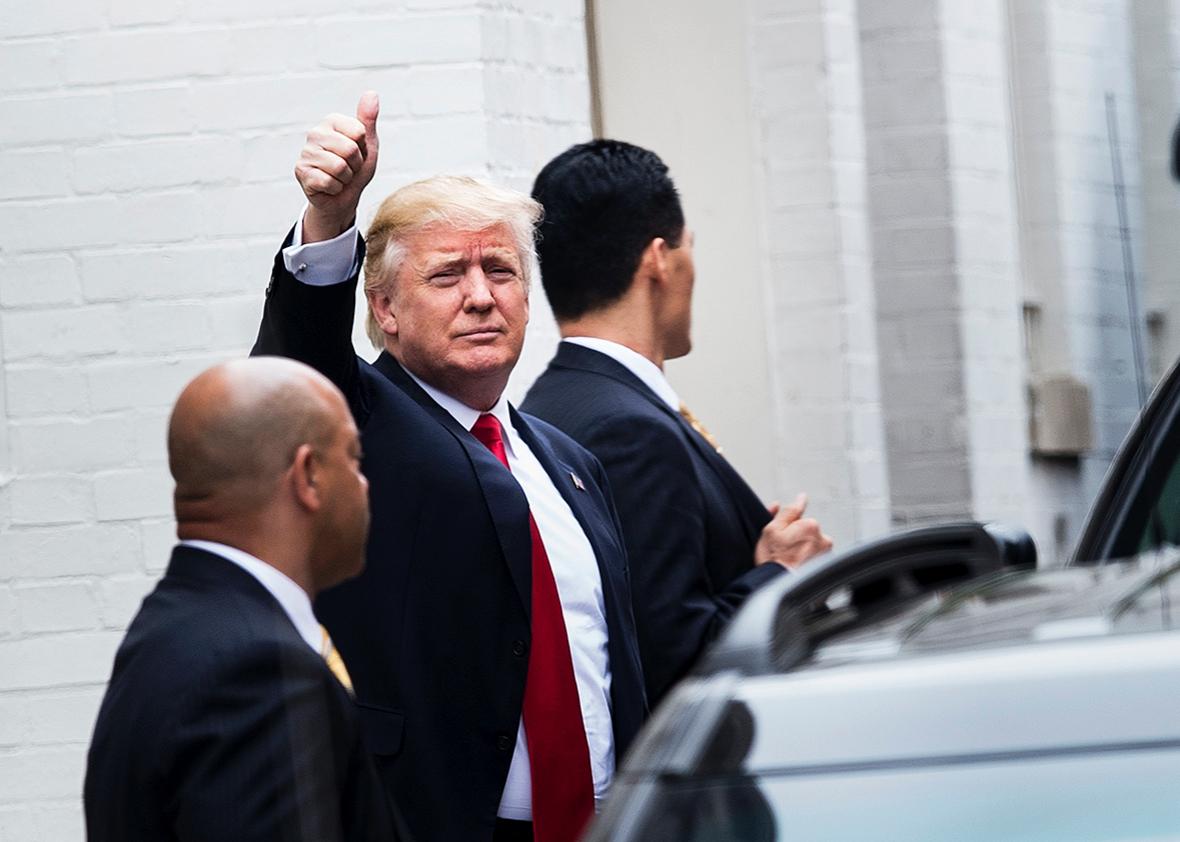On Thursday, Donald Trump came to Washington to make nice with Paul Ryan, speaker of the House of Representatives and de facto leader of the “establishment” Republican Party. The meeting, Ryan told reporters, went well. “Donald Trump and I have had our differences—we talked about those differences today,” he said, adding, “I do believe that we are now planting the seeds to get ourselves unified.”
Ryan followed this with an unconvincing riff on where he and Trump found common ground. “We discussed the core principles that tie us all together, principles like the Constitution, the separation of powers. The fact that we have an executive that is going way beyond the boundaries of the Constitution. … We talked about life, and how strongly we feel about this core principle.”
It was at this point that anyone familiar with the broad contours of the Republican primary might have found himself or herself asking, What are these people even doing? Barring an absolute catastrophe in the fall, Paul Ryan will end this year in the speaker’s seat, either shaping President Trump’s agenda or leading the opposition to President Clinton’s administration. Ryan doesn’t need Trump, for anything.
At the same time, the House speaker is a loyal Republican, and he knows that party unity is key if the GOP wants a clear shot in November. He’s not wrong.
At the risk of gross oversimplification, there are two reasons for the slim margins of modern-day presidential elections. The first is simple partisanship. There are more “independent” voters than ever, but the vast majority of them are reliable partisans—they vote like dedicated Republicans or Democrats, but they don’t identify with the parties. If you judge by behavior and not identification, most voters are on one side or the other, and they don’t switch over. The result is an electoral floor for presidential nominees. If you’re a Democrat or a Republican in a general election, you can expect about 45 percent of the vote, as a matter of course.
That covers Ryan. He’s meeting with Trump, trying to build a partnership with the real estate mogul, in order to send signals to Republican voters. You can support this nominee, and you’ll have to, if you want to beat Hillary Clinton.
What about Trump? Why is he meeting with the Republican establishment he disdained during the primary?
The answer is simple. He needs money. Specifically, about $1 billion.
Yes, he’s (allegedly) a billionaire. But even if he has $1 billion in assets—debatable, since he won’t release his tax returns—he’ll still need a huge amount of liquid cash to fund his campaign for the White House. Soon, he’ll need cash to hire staff; build out an organization; recruit volunteers; craft advertisements and air them in media markets across the country; and fuel the day-to-day activities of a national political campaign, including get-out-the-vote efforts. And he has to do this in a few months, against a fully mobilized Democratic Party.
After all, the other reason for narrow margins in presidential elections is the fact that both parties put forth almost equal efforts with nearly equivalent resources. In 2012, for example, Democrats spent $1.12 billion on Barack Obama’s re-election effort, while Republicans spent $1.02 billion on the push to unseat him. In 2004, George W. Bush spent $345 million to win a narrow re-election race versus John Kerry’s $310 million.
Polarization and financial parity make presidential elections competitive. And losing that parity saddles you with a huge disadvantage. The 2008 election was favorable to Democrats, but the fact of Obama’s unprecedented fundraising (he raised more money in one month, September, than John McCain had to spend for most of the fall) helps explain surprise results in states such as Indiana, a Republican stronghold that broke for Democrats for the first time since 1964.
It’s no exaggeration to say that Trump can’t win the White House without this cash. It is a prerequisite.
But there’s a problem. There are conservative Republicans who don’t want to back Trump. He didn’t just run against their priorities; he gave every sign he doesn’t care about the prevailing brand of conservatism as an ideology, which is why he promised to defend retirement programs from any cuts. This stance, however, creates a money problem. Some of those conservative Republicans are major donors and have ties to other major donors. They are integral to the Republican fundraising effort. Without them, Trump can’t get to his $1 billion.
Why did Mr. Trump go to Washington? Because he needs unity, and, more important, he needs dollars, and a lot of them. A fruitful meeting with Ryan is one way to get both. But it comes with baggage. Trump can’t be Trump—contemptuous of conservative ideology, unafraid of breaking with political orthodoxy—if he wants to get conservative backing. He needs to switch things up. And early signs suggest he’s doing just that. “After the administration has been in place, then we will start to take a look at all of the programs, including entitlement programs like Social Security and Medicare,” said his chief policy adviser, Sam Clovis, on Wednesday. “We’ll start taking a hard look at those to start seeing what we can do in a bipartisan way.”
Most Americans oppose these cuts. Republican elites, on the other hand, want them. And if Trump is going to get their money, he’ll have to profess to wanting them, too. But a Trump who wants to cut “entitlements” is a Trump who could lose his appeal to the moderate, less ideological Republicans who fueled his victory. It’s a Trump who doesn’t just hold unpopular attitudes—on women, on immigrants, on religious minorities—but pushes for unpopular policies as well. He’d have his money and his unity—and an even worse shot at the White House.
Read more Slate coverage of the Republican primary.
